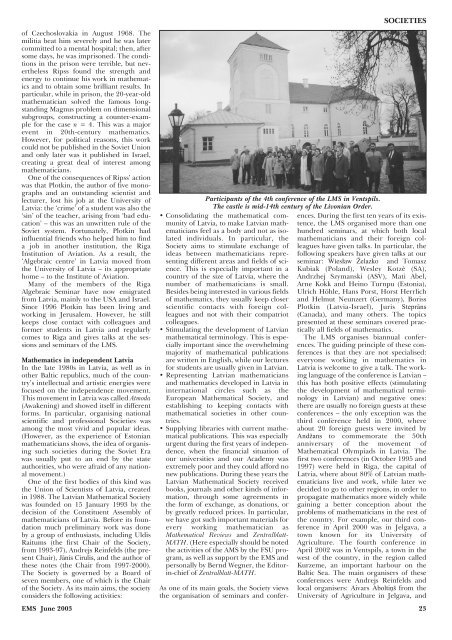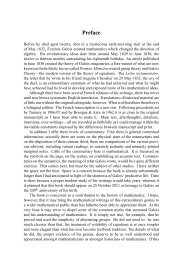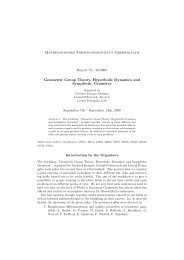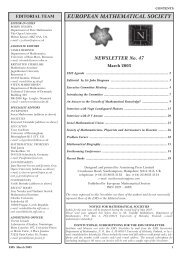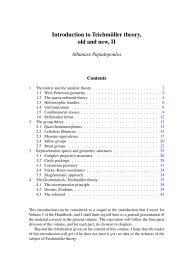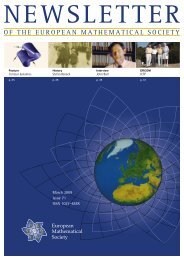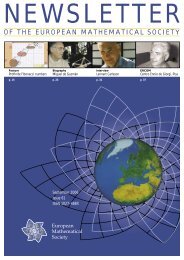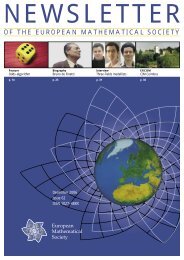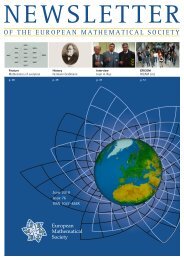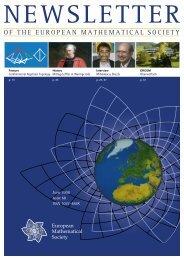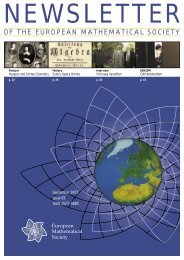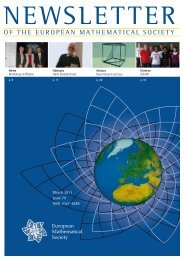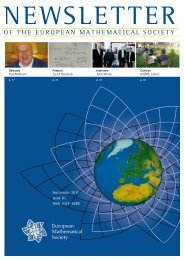June - European Mathematical Society Publishing House
June - European Mathematical Society Publishing House
June - European Mathematical Society Publishing House
You also want an ePaper? Increase the reach of your titles
YUMPU automatically turns print PDFs into web optimized ePapers that Google loves.
of Czechoslovakia in August 1968. The<br />
militia beat him severely and he was later<br />
committed to a mental hospital; then, after<br />
some days, he was imprisoned. The conditions<br />
in the prison were terrible, but nevertheless<br />
Ripss found the strength and<br />
energy to continue his work in mathematics<br />
and to obtain some brilliant results. In<br />
particular, while in prison, the 20-year-old<br />
mathematician solved the famous longstanding<br />
Magnus problem on dimensional<br />
subgroups, constructing a counter-example<br />
for the case n = 4. This was a major<br />
event in 20th-century mathematics.<br />
However, for political reasons, this work<br />
could not be published in the Soviet Union<br />
and only later was it published in Israel,<br />
creating a great deal of interest among<br />
mathematicians.<br />
One of the consequences of Ripss’ action<br />
was that Plotkin, the author of five monographs<br />
and an outstanding scientist and<br />
lecturer, lost his job at the University of<br />
Latvia: the ‘crime’ of a student was also the<br />
‘sin’ of the teacher, arising from ‘bad education’<br />
– this was an unwritten rule of the<br />
Soviet system. Fortunately, Plotkin had<br />
influential friends who helped him to find<br />
a job in another institution, the Riga<br />
Institution of Aviation. As a result, the<br />
‘Algebraic centre’ in Latvia moved from<br />
the University of Latvia – its appropriate<br />
home – to the Institute of Aviation.<br />
Many of the members of the Riga<br />
Algebraic Seminar have now emigrated<br />
from Latvia, mainly to the USA and Israel.<br />
Since 1996 Plotkin has been living and<br />
working in Jerusalem. However, he still<br />
keeps close contact with colleagues and<br />
former students in Latvia and regularly<br />
comes to Riga and gives talks at the sessions<br />
and seminars of the LMS.<br />
Mathematics in independent Latvia<br />
In the late 1980s in Latvia, as well as in<br />
other Baltic republics, much of the country’s<br />
intellectual and artistic energies were<br />
focused on the independence movement.<br />
This movement in Latvia was called Atmoda<br />
(Awakening) and showed itself in different<br />
forms. In particular, organising national<br />
scientific and professional Societies was<br />
among the most vivid and popular ideas.<br />
(However, as the experience of Estonian<br />
mathematicians shows, the idea of organising<br />
such societies during the Soviet Era<br />
was usually put to an end by the state<br />
authorities, who were afraid of any national<br />
movement.)<br />
One of the first bodies of this kind was<br />
the Union of Scientists of Latvia, created<br />
in 1988. The Latvian <strong>Mathematical</strong> <strong>Society</strong><br />
was founded on 15 January 1993 by the<br />
decision of the Constituent Assembly of<br />
mathematicians of Latvia. Before its foundation<br />
much preliminary work was done<br />
by a group of enthusiasts, including Uldis<br />
Raitums (the first Chair of the <strong>Society</strong>,<br />
from 1993-97), Andrejs Reinfelds (the present<br />
Chair), Jânis Cîrulis, and the author of<br />
these notes (the Chair from 1997-2000).<br />
The <strong>Society</strong> is governed by a Board of<br />
seven members, one of which is the Chair<br />
of the <strong>Society</strong>. As its main aims, the society<br />
considers the following activities:<br />
Participants of the 4th conference of the LMS in Ventspils.<br />
The castle is mid-14th century of the Livonian Order.<br />
• Consolidating the mathematical community<br />
of Latvia, to make Latvian mathematicians<br />
feel as a body and not as isolated<br />
individuals. In particular, the<br />
<strong>Society</strong> aims to stimulate exchange of<br />
ideas between mathematicians representing<br />
different areas and fields of science.<br />
This is especially important in a<br />
country of the size of Latvia, where the<br />
number of mathematicians is small.<br />
Besides being interested in various fields<br />
of mathematics, they usually keep closer<br />
scientific contacts with foreign colleagues<br />
and not with their compatriot<br />
colleagues.<br />
• Stimulating the development of Latvian<br />
mathematical terminology. This is especially<br />
important since the overwhelming<br />
majority of mathematical publications<br />
are written in English, while our lectures<br />
for students are usually given in Latvian.<br />
• Representing Latvian mathematicians<br />
and mathematics developed in Latvia in<br />
international circles such as the<br />
<strong>European</strong> <strong>Mathematical</strong> <strong>Society</strong>, and<br />
establishing to keeping contacts with<br />
mathematical societies in other countries.<br />
• Supplying libraries with current mathematical<br />
publications. This was especially<br />
urgent during the first years of independence,<br />
when the financial situation of<br />
our universities and our Academy was<br />
extremely poor and they could afford no<br />
new publications. During these years the<br />
Latvian <strong>Mathematical</strong> <strong>Society</strong> received<br />
books, journals and other kinds of information,<br />
through some agreements in<br />
the form of exchange, as donations, or<br />
by greatly reduced prices. In particular,<br />
we have got such important materials for<br />
every working mathematician as<br />
<strong>Mathematical</strong> Reviews and Zentralblatt-<br />
MATH. (Here especially should be noted<br />
the activities of the AMS by the FSU program,<br />
as well as support by the EMS and<br />
personally by Bernd Wegner, the Editorin-chief<br />
of Zentralblatt-MATH.<br />
As one of its main goals, the <strong>Society</strong> views<br />
the organisation of seminars and confer-<br />
SOCIETIES<br />
ences. During the first ten years of its existence,<br />
the LMS organised more than one<br />
hundred seminars, at which both local<br />
mathematicians and their foreign colleagues<br />
have given talks. In particular, the<br />
following speakers have given talks at our<br />
seminar: Wies³aw �elazko and Tomasz<br />
Kubiak (Poland), Wesley Kotzè (SA),<br />
Andrzhej Szymanski (ASV), Mati Abel,<br />
Arne Kokk and Heino Turnpu (Estonia),<br />
Ulrich Höhle, Hans Porst, Horst Herrlich<br />
and Helmut Neunzert (Germany), Boriss<br />
Plotkin (Latvia-Israel), Juris Steprâns<br />
(Canada), and many others. The topics<br />
presented at these seminars covered practically<br />
all fields of mathematics.<br />
The LMS organises biannual conferences.<br />
The guiding principle of these conferences<br />
is that they are not specialised:<br />
everyone working in mathematics in<br />
Latvia is welcome to give a talk. The working<br />
language of the conference is Latvian –<br />
this has both positive effects (stimulating<br />
the development of mathematical terminology<br />
in Latvian) and negative ones:<br />
there are usually no foreign guests at these<br />
conferences – the only exception was the<br />
third conference held in 2000, where<br />
about 20 foreign guests were invited by<br />
Andþans to commemorate the 50th<br />
anniversary of the movement of<br />
<strong>Mathematical</strong> Olympiads in Latvia. The<br />
first two conferences (in October 1995 and<br />
1997) were held in Riga, the capital of<br />
Latvia, where about 80% of Latvian mathematicians<br />
live and work, while later we<br />
decided to go to other regions, in order to<br />
propagate mathematics more widely while<br />
gaining a better conception about the<br />
problems of mathematicians in the rest of<br />
the country. For example, our third conference<br />
in April 2000 was in Jelgava, a<br />
town known for its University of<br />
Agriculture. The fourth conference in<br />
April 2002 was in Ventspils, a town in the<br />
west of the country, in the region called<br />
Kurzeme, an important harbour on the<br />
Baltic Sea. The main organisers of these<br />
conferences were Andrejs Reinfelds and<br />
local organisers: Aivars Aboltiòð from the<br />
University of Agriculture in Jelgava, and<br />
EMS <strong>June</strong> 2003 23


